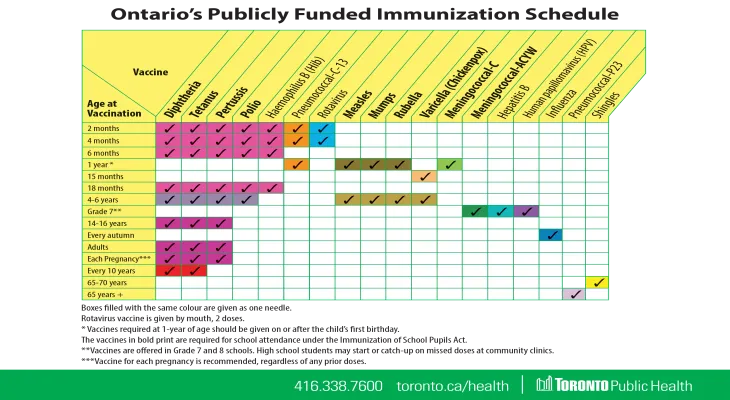Search here
Newspaper
Search here

Arab Canada News
News

Published: March 6, 2024
Vaccination is the process through which immunity or resistance against infectious diseases is formed. This is usually done by administering the vaccine. Vaccines stimulate the body's immune system to protect against infection or disease. Vaccination is considered one of the mechanisms that has proven effective in combating infectious diseases.
Vaccines contain substances with a small amount of weakened viruses, weakened bacteria, or laboratory-made proteins. When the body responds to the vaccine, it builds an adaptive immune response that helps prepare the body to fight the actual infection.
Vaccine Effectiveness
The vaccine succeeds in preventing diseases in 90-100% of cases. In the few cases where the vaccine does not fully protect against the disease, it helps alleviate the symptoms if exposed to the disease. Additionally, protecting most people from the disease also protects others from getting the disease.
Vaccine Side Effects
Vaccination is considered a safe medical procedure, but it may involve some mild side effects that may include the following:
• Pain at the injection site.
• Redness at the injection site.
• Low-grade fever.
• Fever in some cases.
• Allergic reaction in rare cases.
Vaccines and Pregnancy
Pregnant women are advised to receive the measles, mumps, and rubella vaccine one month or more before pregnancy if they have not received it before. It is recommended that pregnant women receive the pertussis vaccine during each pregnancy. The pertussis vaccine is given as the Tetanus, Diphtheria, and Pertussis (Tdap) vaccine. The flu vaccine can also be given before or during pregnancy. A pregnant woman or a woman planning to become pregnant can consult a doctor about vaccines that she can receive.
Changes that occur to a woman during pregnancy may increase her risk of contracting the influenza virus, which may increase the risk of premature birth. When the flu vaccine is administered, the mother protects herself and her baby from the flu for several months after birth. The timing of the influenza vaccine varies by season, and it is recommended to be given at the end of October.
The following vaccines are required under the Immunization of School Pupils Act (ISPA) in Ontario and the Child Care and Early Years Act for children who attend school and childcare or have a valid exemption:
1. Measles
2. Mumps
3. Rubella
4. Varicella (Chickenpox) - Applies only to students born in 2010 or later
• The MMR or MMRV vaccine protects against measles, mumps, rubella, and chickenpox
• At 12 months of age, one dose of the MMR vaccine is given
• At four to six years of age, the second dose of the MMR vaccine is usually given in a combined vaccine with the varicella vaccine (MMRV).
5. Diphtheria
6. Tetanus
7. Pertussis
8. Polio
• Usually, one vaccine (such as DTap-IPV-Hib) is given for protection against diphtheria, tetanus, pertussis, and polio.
• Five doses, given at two, four, six, and 18 months of age, with a booster dose at 4 to 6 years of age.
9. Meningococcal
• There are four types of meningococcal vaccines available for different strains
• At 12 months of age, one dose of meningococcal C vaccine is given. It covers strain C
• In grades seven and eight, one dose of meningococcal ACYW-135 vaccine is given at school. It covers four strains.
These routine childhood vaccines are free but not required, although highly recommended:
1) Pneumococcal Conjugate 13
• There is one vaccine against pneumococcus for children: one injection given at two, four, and 12 months of age
2) Rotavirus
• The vaccine is given as oral drops at two, four, or six months of age
3) Haemophilus influenzae type B (HiB)
• Usually, one vaccine (such as DTap-IPV-Hib) is given for protection against diphtheria, tetanus, pertussis, polio, and Haemophilus influenzae type B.
• Five doses, given at two, four, six, and 18 months of age, with a booster dose at 4 to 6 years of age.
4) Hepatitis B
• Two or three doses of hepatitis B vaccine are provided for students in grades seven and eight, available through the School Immunization Program (SIP)
5) Human Papillomavirus (HPV)
• Two or three doses of Human Papillomavirus vaccine (HPV9) are given to students in grades seven and eight through the School Immunization Program (SIP)
6) Influenza
• Anyone six months of age and older can receive the flu vaccine
• One dose of the flu vaccine is given annually during the "flu season"
7) The COVID-19 vaccine is not part of the vaccination schedule in Ontario, but it is also free and highly recommended. Everyone six months of age and older is encouraged to get the COVID-19 vaccine and stay up to date with vaccinations.
Source:
Comments